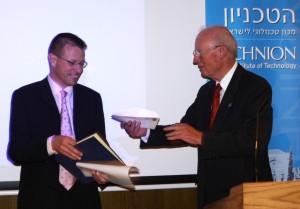Professor Ulrich Martin receives science prize of the German Technion Society

The German Technion Society has awarded Professor Dr. Ulrich Martin, director of the Leibniz Research Laboratories for Biotechnology and Artificial Organs (LEBAO) of Hannover Medical School (MHH) and deputy coordinator of the REBIRTH (From Regenerative Biology to Reconstructive Therapy) cluster of excellence, as well as Professor Dr. Ilan Marek, Institute for Chemistry, Technion – Israel Institute of Technology – the Scienze Prize of the German Technion Society e.V. on May 6, 2010.
Every two years, the society awards two young scientists, who acquire particular credit through scientific cooperation between the Technion and Germany. The prize is annotated with 5.000 euros per award recipient and is supposed to support scientific cooperation.
'I am very grateful to the very tight and friendly cooperation with the Israeli colleagues over years and I am markedly honored to be selected for this considerable science prize', Professor Martin said. For eight years, Professor Dr. Martin and Professor Dr. Joseph Itskovitz-Eldor, director of the department for obstetrics and gynecology at Rambam Medical Center, Medical Faculty of the Technion, are mutually exploring embryonic and so called induced pluripotent stem cells.
Currently, they are developing a method for high throughput production and differentiation of pluripotent stem cells. Furthermore, the exchange between German and Israeli students is a special concern of the cooperation. With respect to a lab course programme, a regularly exchange of junior scientific staff between the Technion in Haifa and the Leibniz University in Hannover/MHH takes place.
'The Technion is an important partner for us. Probably, further cooperation will arise in future in the area of stem cell research, tissue engineering and nanotechnologies – since the Technion aims for similar research foci like we are doing in the cluster of excellence REBIRTH', Professor Martin says. The cooperation is promoted on German side through the Lower Saxony Ministry for Science and Culture and the Federal Ministry of Education and Research.